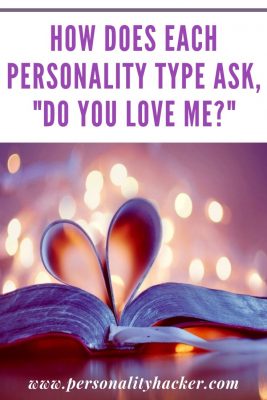In any romantic or pair bond relationship, there are myriad ways that a couple communicates to each other. Words, actions, expressions, mannerisms… we’re looking for and sending endless signals to and from our mate.
And while there are a million things each person says (both verbally and non-verbally) every day, it could be argued that there really is only one thing we’re actually looking for: the answer to the question, “Do you love me?”
According to Gary Chapman’s “The 5 Love Languages” we all express love a little differently. In Chapman’s model, the 5 primary ways are:
- Acts of Service
- Quality Time
- Gift Giving
- Words of Affirmation
- Physical Touch
(For a quick reference listen to the Personality Hacker podcast “The 5 Love Languages.” For more in-depth information, read Chapman’s book of the same title. It’s a great read – we highly recommend it.)
These are five very important modalities of communicating love, and knowing which one you and your mate favor can make or break the relationship. That said, while we communicate love in different ways, we are also looking for very specific markers that transcend the form of communication – we’re looking for specific criteria which means love to different types.
For example, we might have a “Words of Affirmation” Love Language and we’ll always feel good when someone praises us. But what are they praising us for? Does it match our internal ‘list’ of important things? For example, one woman might be over to moon to hear her husband praise her beauty to his friends, and another woman might feel marginalized.
How “Evaluation” Becomes “Love”
In our program Couples Mapping we discuss how different personality types both ask the question, “Do you love me?” and how they answer it, “Yes! I do love you!” Here’s where it gets tricky: each personality type asks it in a slightly different way, and concurrently answers it in a slightly different way.
|
A quick refresher on how the 16 Myers-Briggs personality types correlate to their 'decision-making' mental processes: All FJs use the mental process called Extraverted Feeling, or “Harmony” to make decisions. All FPs use the mental process called Introverted Feeling, or “Authenticity” to make decisions. All TJs use the mental process called Extraverted Thinking, or “Effectiveness” to make decisions. All TPs use the mental process called Introverted Thinking, or “Accuracy” to make decisions. |
The “decision-making” mental processes (Harmony, Authenticity, Effectiveness, Accuracy) are ways we evaluate the world and determine their rightfulness, truthfulness and importance to us as people.
Every personality type has a tendency to overvalue their criteria, and unless you understand the concept of different types it’s very easy to assume others are using the same criteria to make evaluations and decisions. That is, if you’re an Effectiveness person it may be very difficult to understand another person who is using, say, Accuracy. When they come to a conclusion that favors conceptual analysis over what works, the assumption is that person is being short-sighted, and somewhat stupid.
Since we all do this (to some extent), in a romantic relationship this can be disastrous. On some level we ‘get’ that other people see the world differently than we do, but without a solid model these differences end up becoming gender stereotypes. “Women just want men to listen to them and not solve problems,” or “Men just want to be alone in their ‘man cave’ when they have problems.”
Since there is definitely a gender skew in personality types, these stereotypes play out often enough that we take them for granted. Real trouble surfaces when we’re a personality type not common to our gender but we’re still expected to play out the normal ‘script’. When our mate can’t ‘read’ or ‘predict’ us (or vice versa!) it can become a serious issue.
It’s a frustrating exercise trying to communicate love (and look for markers of love from your mate) only to watch the attempts fall flat. In most things to ‘fail again, fail better’ is a noble pursuit, but in love if we believe the answer to our question “Do you love me?” is “No” or “I’m not sure” too often, you can do real damage to your own heart and your mate’s.
Knowing your own decision-making process and your lover’s is a much easier way of being able to say clearly, “When I look for love, this is what I’m looking at.”
How “Harmony” asks “Do you love me?”Myers-Briggs types: ENFJ, INFJ, ESFJ, ISFJ
How “Harmony” answers: “Yes! I love you!”
|
How “Authenticity” asks, “Do you love me?”
|
How “Effectiveness” asks, “Do you love me?”
|
How “Accuracy” asks, “Do you Love Me?”
|
Did this resonate with you and what you know of your type? Were you able to spot your lover’s decision-making criteria, and how can it help you communicate to them that you love them in a way that’s meaningful to them?
Let us know! Leave a comment and share your experience.
-Antonia
Interested in gaining deep insight into how you and your lover operate within your relationship? Want to get to the next level of intimacy on a deep, cognitive level? This article is just a taste of our full course “Couples Mapping: Personality Types in Marriage & Relationships."
When you’re ready, here are five ways we can help you grow…
1. Reclaim Authorship of Your Life (Free Audio): Become the Main Character Your Own Life
2. Regulate your Body, Emotions, Thoughts, & Intuition with Self-Regulation Mastery
3. Understand yourself at a deeper level with a Personality Owners Manual
4. Master the Art of “Deep Reading” people in Profiler Training
5. Rewire your Brain & Build a Life that Fits You in the Personality Life Path


Share:
Question from Readers - Best Books for ENFJ Growth
When You ALMOST Know Your Personality Type (aka "Between Two Types")
42 comments
I see you never mentioned and INFP. I’m one, and I totally understood everything you said! I especially liked the part where you said you were learning perspective.
See, I have 2 INFJ friends (very odd, and rare. I actually literally, and not joking, feel so blessed). I also have an 18 yr old daughter who is INFP, her best friend is as well, and I am friends with 2 other INFPs and one ENFP.
Let me just say, one reason I am blessed is because we rarely all disappear at once, so I always have at least one that I can talk to without feeling like a complete lunatic.
My INFJ friends (one male and one female) are always telling me how wise and amazing I am. They actually appreciate the things I do for them, and are reciprocal! They go out of their way to say thank you, and they also value my authenticity. I’ve been tested… and I don’t mind.
They think I can help them make better decisions. Oddly, they both asked me if they were narcissists, wonder why that is? I was in a highly abusive relationship with a covert narcissist for 4 years. Who knows what his personality type was! They don’t tell the truth about anything! Mine wouldn’t even take the test! Neither one of my friends could possibly be one… first of all… they asked, and second, they didn’t want to be so they felt it was a problem. Narcissism in general, and especially covert narcissism as a personality disorder, by it’s very nature would mean that neither thinking you have a problem, nor thinking yourself a narcissist could happen.
The thing is perspective rarely enables me to formulate a concrete decision EVER! I overthink everything! I ask questions till there’s none left to ask! It’s annoying!!! Out of the box thinker to the power of lunacy!
Just the idea of “a box” gets me going. What color is it? Why get in it? What’s it made of? Where was that material manufactured? Can I flip the box over? Can I sit on it after I flip it over? Will someone be upset if I sit on the box?
Do you see this? However, the INFJs in my life love it! With other INFPs and the ENFP, we never stop going back and forth. We’ll even stop the coversation, and then a year later, pick up on it and continue it. Especially if someone says… “but back to the point I was making…”
You and I definitely think differently, but for some reason INFP and INFJ just “get” each other… thank you for your story and input, hopefully my scattered thinking has enlightened you in some way!
So, I’m an INFP female. I have had this really close friend for the last 3 years who is an INFJ male. Him and I are about 15 years apart in age, he is 25 and I am 41 and I feel the age difference is too much.
Here’s the thing… according to this, he’s both asked if I love him, and he’s told me he loves me… of course we’ve used the words “I love you” in terms of a connection and understanding each other on some deep level, which no one has understood us before. But, he really does love me, and even though I’ve used the words above to ask him if he loved me… I’ve never told him I love him with those words… it gets more interesting…
So a few years back I had a brief sexual relationship with an ENTP. He is back in my life now. We connected intellectually even then, but it’s been way more intense lately and we have both been damaged extensively by toxic partners.
According to this he’s asked me if I love him… but never has said he loves me.
I’ve told him I love him, according to the above, but I’ve never really asked if he loves me…. thing is… we don’t say I love you, we dart around it out of fear.
We actually have discussed it. We both say we can’t say we love each other but it’d be lying if we said we didn’t.
The INFJ and the ENTP have met… and even if I wasn’t in the equation, they wouldn’t get along… they would be better at pretending and would have sone interesting conversations, but their attempts are quite weakened by my presence. The INFJ sadly has distanced himself. I do love him, but the age thing really does bother me. His mom is only 2 years older than me. Also, the ENTP is my age…
I don’t expect an answer, but I’m sure there are several personality types that may find this highly interesting, if not at least valuable… or maybe I just needed an outlet to vent this without anybody knowing who I am! Then again, maybe a bunch of INFPs, INFJs and ENTPs have some input?
As per the idea you mentioned once — that our auxiliary is how we show love (as the nurturing parent) and our tertiary is what we ask for in love (as our ten-year-old) — do you think that might apply here? For example, would an ENFP be “asking” for the love language of “Effectiveness” whereas an ISTJ would be showing the love language of “Effectiveness,” etc?
I always thought I’m an accuracy type. But having read this, I feel like I related more with authenticity type :/
Yes, this article certainly resonated with me…when I consider “healthy” individuals. I’m an INFJ and was married to a narcissistic ESFP for many years. He did not operate in our relationship as the FP you describe above, and I attribute that to his narcissism. I’ve known other FPs though whom I could see your list as accurately describing…my son is one of them! I would say that readers need to keep in mind that when personality disorders come into play, the game changes.;-)